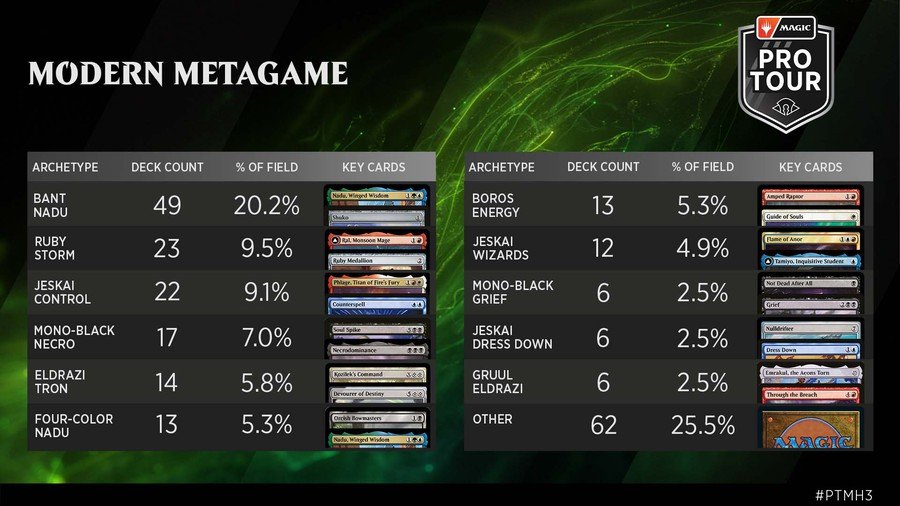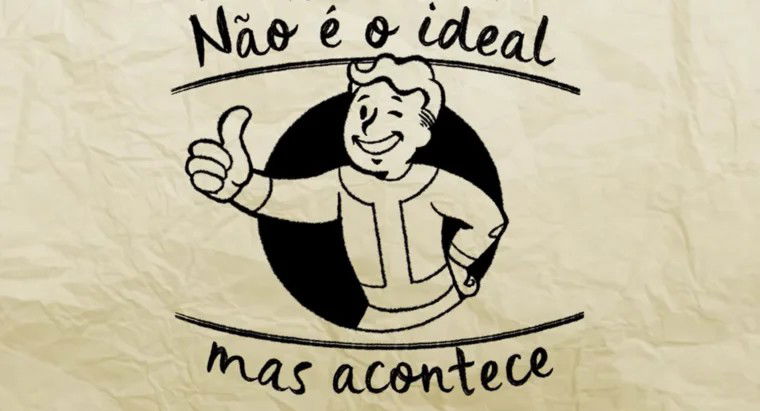On last Tuesday (July 24), Wizards of the Coast PR Representative Blake Rasmussen announced during the WeeklyMTG show that the next Banned and Restricted announcement for the game will not be brought forward and will remain on the scheduled date: August 26, 2024.
On the same livestream, Blake mentioned that even though a Modern format RCQ season starting in two weeks, they prefer to retain the integrity of the dates Wizards proposes for their bans as it is best for Magic and allows players to prepare accordingly, and they are considering ways to establish more assertive dates so as not to harm the base of the competitive scene.
The backlash, of course, was pretty negative: social media was flooded with complaints and comments about how the first half of RCQs is ruined due to a broken format people don't want to play, and even Magic: The Gathering big names expressed dissatisfaction with Wizards' inaction regarding the elephant in the room on the current competitive Modern, Nadu, Winged Wisdom.
But how bad is this decision really for the game, and is Wizards wrong this time? Let's be clear from the outset: no, it's not. Whether it's a compromise or, as some speculate, a business issue, the decision to stick to the planned schedule is, in fact, beneficial for Magic in the long run.
Not changing the banlist date is good for the game in the long run
There was a time, as mentioned by Rasmussen on the show, when Wizards established the rule of banning as necessary, with announcements without scheduled dates that later became a one-week notice, which moved markets, caused cards like Splinter Twin to rise in price due to speculation, among other consequences common to its time.
For those who played competitive Magic and invested money in the game to participate in tournaments or qualify for them, this period is one of the darkest in the game: the insecurity of not knowing when their cards would be banned discouraged players from trying out the new best decks outside the digital environment. After all, who would want to invest in the new staple and/or the archetype that stood out in the Pro Tour to play in a local store? And those who invested in staples ran the risk of them being so prevalent to the point of being banned.
In the end, the “surprise ban” formula created a lot of insecurity in all levels of competitive play; in the purchase of singles, in training with a list for a big tournament, in the preparation of other players’ Sideboards and in the guides which are so common on the internet today, and several other consequences that, in the end, led Wizards to return to the standard of scheduled dates, used by the company for over a decade back then.

Since then, we have had few cases where interventions were made outside the planned schedule, with the most recent being the pre-ban of Cranial Ram on Pauper, where the PFP, the official committee for the format, operates separately from Wizards and has autonomy for out-of-date announcements, of which Gavin Verhey, spokesperson for the committee, mentioned in the last announcement these measures are exceptions and should not be treated as the norm for the game.
There is another important detail in the Cranial Ram announcement that we are seeing right now: making exceptions naturally leads to new expectations. No matter how much someone say “this is an exception”, players will expect it again, and if this happens more often, the integrity of the current banning system is deteriorated and leads, once again, to the fear of investing in cards and/or training with the best deck because of the risk of, overnight, losing an entire list.
Therefore, the decision to keep the August 26th date for the probable changes in several competitive formats is not only expected but the best possible decision for the medium and long-term health of competitive Magic and the trust that its target audience has in relation to the money they invest in colorful cardboard pieces in their search for entertainment, satisfaction and good results.
Social media time is not the same as real-world time
This logical abstraction will not ease anyone's frustration. As much as Blake perfectly explained the reasons behind not intervening in Modern before the RCQ season, players, influencers and others will be echoing this on the old Twitter, Reddit, Instagram, TikTok, Facebook and any other social media of your choice - it is their space to express outrage, it is their corner in the modern Ágora of our society, whether for a colorful cardboard game or for any other subject.
The time of social media, let's face it, is very different from the real world. Think about how many debates about society spend months or years being echoed on the networks before reaching any plenary, or court. Cases where these things happen overnight or within a week are rare and require large-scale social mobilization, and yet, there are spheres that cannot and should not give in to the furious clamor of social media: legislation takes years to be applied in a society, and political decisions, ideally, would be more thoughtful before trying to “play to the digital crowd”.
Magic is not politics or a law, but it is a business, a product to be sold. As such, it follows a very delicate balance and is full of notorious inconsistencies when it comes to public reception: on the one hand, a brand wants to keep its social media audience constantly engaged with its product (hello, perpetual spoiler season), on the other, the company cannot make all decisions based on what internet want.

For better or worse, Wizards follows this logic. Just as the angry masses don't stop the company from previewing a new expansion that's coming out in six or nine months, it also doesn't force the company's hand in changing its banning schedule, although the dissatisfaction of the masses can, indeed, impact which cards are banned - perhaps as much as commercial decisions.
And aren't we too impatient? Gaming communities, in general, don't really know what they want: on the one hand, we complain about having to deal with bad formats for another month until the company fixes them, on the other, we don't like the idea of immediate interventions because they take away the security of buying the product. We're in a hurry, but not to the point of wanting bans at any moment, we want new cards for our decks, but we don't want power creep, we seek stability in competitive formats, but we let the hype take over at the first appearance of a card that's coming out in six months.
Magic has many players and, naturally, this same proportion of plurality of ideas who make unanimous movements impossible because, just like our society, we tend to see things in the spectrum of our needs and not in the abstract and collective scope of which, in general, would be very capable of lead us to permanently stop playing this game.
But allow me to introduce another of the long boomer player stories: before the announcements without a set date, bans in Magic occurred, on average, every three months. This generated, as it does today, security and expectation of how long you should have with your investment in a new deck.

Did you put together a list of Hogaak, Arisen Necropolis when Modern Horizons came out? Congratulations, you have three months with it (it ended up being more because they banned Bridge from Below first). Were you playing Modern in 2016 and caught Death's Shadow when it changed the entire Metagame? You knew that, in three months, we could have a ban. And there is no difference between those circumstances and Nadu, Winged Wisdom, which solidified itself as a problem after its notorious results at Pro Tour MH3 on June 28th.
Between the release of Modern Horizons 3 and the next banned and restricted update, there are approximately two and a half months of distance. Yes, two and a half months in which Modern was taken over by an archetype that offers a terrible play experience, and let's not even start on the delay in banning Grief from Legacy or dealing with Amalia Benavides Aguirre on Pioneer due to logistical issues, but for the current trending format, that's a two and a half month wait.

What has changed is the data collection and the player base. Today, information is passed around much faster through these same social media channels that have also accelerated our perception of time. When players frequently share they made Top 8 with the best deck in Modern and/or about how Nadu creates one of the worst game experiences in all areas, the feeling of urgency in the collective sense grows, which, in turn, makes two and a half months seem like an eternity - and the current window, with more releases and where we are always seeing new previews and cards does not help in this regard either.
And this clamor for temporary solutions also diverts the focus from what the real problem is, the one that started this sequence of recurring broken states in all eternal formats.
The problem is Modern Horizons' design philosophy
Power creep will always exist. When Counsel of the Soratami became Mulldrifter, it was a power creep, and when Quick Study came out in Wilds of Eldraine, it was also another power creep.

As card games age and more products come out, it's natural that new cards with more efficient versions and/or slight upgrades of old effects will come out. It's part of keeping the game fresh and motivates people to buy its product, the basic element of any TCG and an inevitable force, mostly independent of the player's will.
Power creep, however, is a balance. At some point, it goes up too much and, eventually, it has to go down. This is why, every now and then, we see a Standard set which is less impressive when compared to the others in its cycle. Otherwise, either the game breaks down, or it will live in a perpetual escalation of power that will eventually lead to its ruin and general dissatisfaction among players.
The Modern Horizons product line and any other product aimed at eternal formats, however, do not need to worry about this. On the contrary, bolder designs and more powerful synergies are motivated in this product to intentionally impact Metagames where Magic's vast history is based.

The result is always clear in the first few weeks: formats change completely, and even when the power level doesn't try to "keep up", like in Lord of the Rings, certain cards become so prevalent they change the entire competitive structure, as was the case with The One Ring and Orcish Bowmasters - two controversial staples in Modern and Legacy, respectively.
The recurring power creep for eternal formats, aiming to impact them and thus transform the product into a sales success - the primary objective of any company - is what has made Magic become more unbalanced when we look at the general scope: more efficient effects, lower costs, increasingly larger text boxes, mechanics that interact in unexpected ways because it is possible to work more boldly in sets like Modern Horizons, create an environment where “rotation” has become common even in formats where, before, players boasted about not needing to constantly invest in new decks.

Just look at the Pro Tour Modern Horizons 3 Metagame: of all the most played archetypes, only Mono Black Grief remained among the archetypes of the “old Modern” and its results compared to the Necrodominance lists were so poor that it was clear which one was the best choice.
If something needs to change so that we have fewer situations like Nadu, it is to stop creating products for eternal formats which changes them entirely because this opens up more possibilities than the Metagame can handle. In Modern, 7 of the 10 most played decks today were born or re-emerged with MH 3, in a format considered unbalanced and unfun.
The bad news, however, is that this isn't going to happen, not anytime soon: Magic players love when formats changes. Even if a vocal portion says otherwise, it is possible to prove both from local and general experience that interest in Modern increased after MH3 while Pioneer, a format unaffected by the set and whose competitive environment has been stable for about six or more months, has lost popularity and received criticism for being “stale” and/or “miserable to always play against the same decks” - another change in public perception that, in the past, defended the stability of their investment over innovation.
Power Creep requires more Interventions
But if expansions like the Modern Horizons line force rotations and push the power level of a format exponentially upwards, it is up to Wizards, if it cannot remedy the power creep, to make more assertive decisions about dates and bans.
Three months, the “normal” standard for most formats, may actually be too long for Modern Horizons. Nobody likes playing broken formats, and having RCQs right after to promote your product is not a plan that considered the possibility of the Metagame breaking the way it did.

Nadu is certainly one of those cases, and not even by numbers: it is an inconclusive looping* strategy, that is, at some point, can fail for some reason and, consequently, stop the combo, sharing a trait that led to the ban of Krark-Clan Ironworks in Modern, in addition to spending too much time “doing its things”, a trait in common with the reason they banned Eggs from Modern and Sensei’s Divining Top in Legacy.
As if that weren’t enough, its numbers in Pro Tour MH3 were absurd, perhaps only not higher and more prevalent than Eldrazi Winter. It was the most anticipated deck, placing five copies in the Top 8 and starring in two rounds of the quarterfinals and finals with mirrors - it was above the rest of the scene even with a giant target on its back, and still won the tournament.
Finally, we can't ignore the logistical factor: Nadu is very tricky to pilot manually. If it's already hell to play on Magic Online due to clicks, imagine having to write down all its triggers and remember each time one or another effect was triggered until you reach a loop? How many judge calls will situations around it cause in RCQs? How many games will be won or lost due to a misinterpretation of the rules around it and/or some missed trigger?
Although I agree with the decision to maintain the original banning window, the existence of such an archetype and such complex matchup situations creates the need to establish more assertive dates to make RCQs fairer and with healthy environments regarding deckbuilding and game development. And, since we're talking about convoluted game states, it's worth mentioning Amalia should have been banned from Pioneer for the same reason months ago.
But what about the RCQ season?
The season loses. It's a fact.
Having a ban in the middle of RCQs basically means players will need to prepare for another Metagame while playing tournaments. Many are certainly already experimenting with techs and archetypes that could benefit if Nadu, Winged Wisdom is indeed banned on August 26th.
Now, let's face it, this isn't the apocalypse and the "trade" is relatively fair: those who chose to play Nadu this season know that the archetype will lose something, potentially its key card because any other choice will be a mistake similar to Bridge from Below, so they'll have a few weeks to play the archetype before losing it forever. Some certainly consider this a fair trade.
On the other hand, there will be environments and RCQs, especially from local and/or smaller stores, where it's likely that not even a Nadu list will show up in the Metagame due to all the inherent consequences of playing it. After all, we are talking about a tiresome archetype, with many triggers, that consumes a lot of time and will probably disappear, and there are also players who will not see this “change” as profitable and, therefore, won't waste time investing in a list.
There is the risk of compromising events and the absolute best deck dominating environments, the sudden change with a ban in the middle of the season is a problem that should not happen, the past banlist schedule should have happened after Pro Tour MH3 and have banned Nadu, but none of these spells the end of the world for anyone or for Magic.
RCQs will happen, players will qualify, new lists will emerge and disappear, the Metagame will change, bans will take place on August 26, the game will go on.

Thanks for reading.













— Comentarios 0
, Reacciones 1
Se el primero en comentar